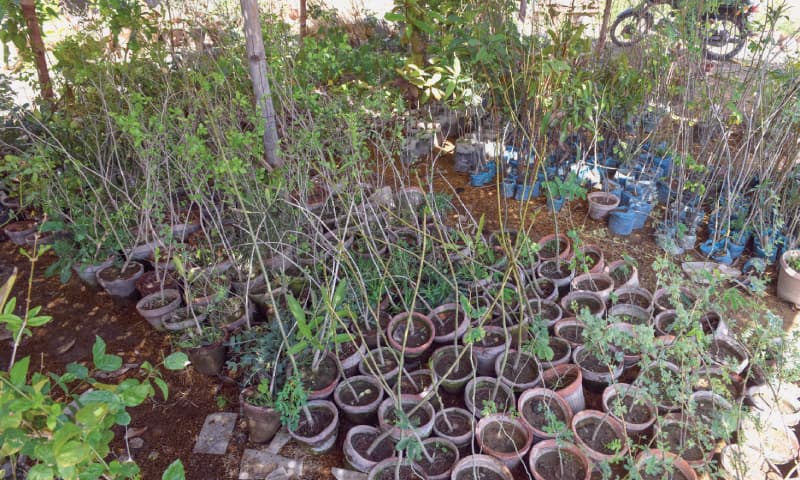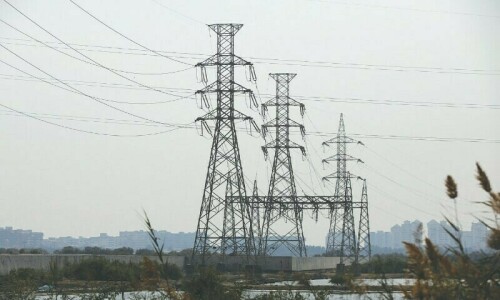KARACHI: As you enter Shahzad Qureshi’s urban forest in Clifton, you are greeted by the fragrance of freshly-watered plants and the wet soil. The shiny leaves swaying in the gentle morning breeze have a soothing effect on the mind. The frown on your face is replaced with a smile as you encounter patches of wheat, maize, onion, tomato, potato, eggplant, beetroot, coriander, spinach, lettuce, broccoli and kale.
The forest spread over three acres is still in its developing stage. Qureshi, who adopted it for five years from the Karachi Metropolitan Corporation (KMC) in 2017, lives nearby. He said that although this land was an amenity plot reserved for a park it was being used as a garbage dump. “So I approached the KMC offering to help develop it,” he says.

Having signed the required legal document for the adoption, Qureshi decided to begin a pilot project on a small portion of just about 500 square metres. Meanwhile, he also got in touch with landscape architect Umer Yousuf. “He prepared the designs with complete 3-D animation, execution plans, etc. By the time we are done, 80 per cent of the land will be covered by trees,” he says. A copy of the planned landscape has also been put up in the middle of the land.
So the plan is to create a thick forest full of trees with some grassy patches too around the lake. “Yes, the grass areas can also serve as picnic spots for visitors,” says Qureshi.

In a dense portion of the forest, as you carefully step on the soft mud to avoid the little puddles forming there due to recent watering you notice a little orange bug with black spots crawling happily towards a tree after its rendezvous with a shrub. You make sure not to step on it. Some of the plants have leaves that have been eaten up by the bugs and caterpillars. “I want a buffet party for all bugs,” Qureshi laughs when the eaten-up leaves are brought to his attention.
“Bugs, caterpillars, butterflies, worms, insects, frogs, etc, are all very much welcome in this urban forest.” he says. “They all help the ecosystem,” he adds while explaining that the bugs will have something such as birds following them as the insects will be gobbled up by frogs. “It is all perfectly natural but here in the city we have a mindset for perfect neat and clean manicured gardens. You’d rather have plastic plants and trees if you want greenery but sans bugs and insects. But if you want a real garden you need to know that there are other things which are also supposed to exist there because we are all connected in a web of life. We have read about it in our science books when we were children but then we forgot all about it,” he says.

About the trees and plant species that are going to make up the urban forest, Qureshi says that his focus is on native species. “But these days, you don’t get many native plants in the nurseries, which prefer selling fancy expensive plants,” he says. After pulling out the few Conocarpus trees he found on the land, he started planting neem, keekar, sukhchain, bougainvillea, canna, etc. Everything is allowed to grow naturally. “It’s all organic. There are no chemicals being used here,” he says.
But then what happens when there is an insect infestation? What if the fruit and vegetables are eaten up by the insects? “Then we eat their leftovers,” Qureshi laughs. “No, seriously,” he says, “you have to taste organically-grown vegetables. You won’t ever want to eat the produce you get at the greengrocers after that,” he says.
Even the manure for the soil is mostly compost. Qureshi has had a ditch dug out towards one side of his forest for all kinds of rotten fruit and vegetables and kitchen waste. “I ask everyone to not throw away their kitchen waste such as fruit and vegetable peels and donate to us for the purpose of producing compost,” he says.
Other donations for the urban forest can be made by buying plants and trees from there. “You can buy and plant a tree in the forest for Rs950 which includes all the care it would be receiving here,” he says. As you walk along the path where the trees have already been planted you notice the plates bearing the names of the people who planted them. “In three years, these trees would get quite big and the forest would really look like a forest,” says Qureshi.
The urban forest is not just about growing a forest in the middle of the concrete jungle, it is also about spreading awareness of the importance of planting trees. For this Qureshi offers field trips for schoolchildren where they are also encouraged to plant trees. And despite being an entrepreneur, running successful businesses, along with taking care of the urban forest, he also takes time out to visit schools to give talks about the benefits of plants and trees in our lives.
Published in Dawn, March 17th, 2019













































